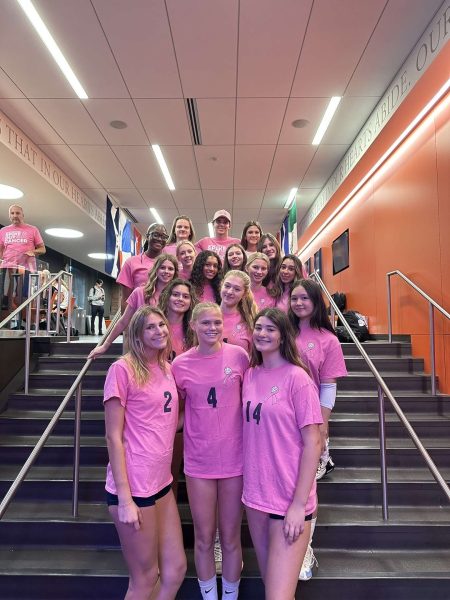Student Government’s Imbalanced Gender Ratio
September 17, 2019
When the student government walked onto the stage during one of the year’s first assemblies, students giggled with excitement as they prepared to watch a thrilling game of Deal or No Deal. The game was a lot of fun, with creative prizes, an eager banker, and plenty of jokes made throughout. Students were so caught up in finding out just how many cookies Cindy had given away, or if she would pie Nick Chu, that it was easy to overlook who exactly was on the stage and who wasn’t.
It’s no secret that Latin’s student councils have never been especially diverse, but this year’s group is particularly unrepresentative of the student body. This year, girls make up only three out of sixteen members of student council, and an overwhelming majority of the group is white.
Grade reps Maya Passman, Jessica Flohr, and Shreya Wonjo must navigate being the only girls in a club full of boys. Maya, a senior who has served on student government for the past three years, says, “obviously it doesn’t represent the school enough, because there’s only three girls and the school is actually majority girls.” She explains that the lack of representation isn’t just about gender, as the group is “not even guys, it’s just like white guys.”
Sophomore grade rep Shreya Wojno, who has been on student government since her freshman year, agrees. From this year’s very first meeting, “it just felt like you were surrounded [by guys] in a sense, and a lot of the voices that were being heard were all guys, especially upperclassmen.” Even though some girls are present, the guys dominate the space. Shreya says, “we have to do so much more to be seen just as much as the guys are: with them showing up to one meeting, making jokes, leaving early, and still getting their ideas heard right away. The three girls show up to every single meeting and our ideas still aren’t heard.”
The girls are not playing the blame game, as they recognize that this is a larger issue than one group of guys or one student government. Maya says, “it’s not anyone’s fault, Nick [Latin’s senior prefect] is doing the best that he can, but there’s only so much that you can do with the group that you have.” If there is no one specific “to blame” for this struggle to have voices heard, how did it happen?
Many students claim that the problem stems from not enough girls running, but that is simply not the case. “People make the excuse that there aren’t female candidates, which is just not true,” explains senior Lulu Ruggerio, a co-head of Latin’s Alliance for Women. Out of last year’s 22 candidates, 44 percent were girls, and while that percentage is below fifty, it is not far off.
In fact, last year, many girls ran for positions on the executive board. “It was inspiring to see as an underclassmen,” says Shreya. She highlights that for younger students, “seeing a girl run, while it isn’t enough, it’s something.”
Girls are running, but for whatever reason, they are not getting elected, with the 12 percent female student council sitting in stark contrast with the 44 percent female candidate pool. Some students argue that the guys won simply because they were indeed better candidates, and, according to junior Milana Jozwiak, “they presented better campaigns and speeches.”
However, it is possible that girls struggling to get elected is due to something bigger than that. Maya points out, “a majority of the club heads are girls.” She argues that this shows that “girls in the school are committed, qualified, and have great ideas when it comes to an interview,” making them equipped for the positions that they run for. Despite these qualifications, girls still have a very difficult time getting elected.
Some students credit unchallenged societal norms to this disparity. “It’s very underlying, whenever you think of an authority figure, most people think of a guy, and it’s not your fault that you think of a guy, that’s just how society is.” In addition to struggling to see them in leadership roles, people are extremely critical of women, making it nearly impossible for them to appear as “electable.” For girls, “there’s no easy ground – you’re either trying too hard if you’re too funny, or you’re not authoritative enough if you’re too nice, or if you are authoritative, you’re mean.”
Even girls fall into the trap of putting one another down. “We can talk all we want about boys not voting for girls, but you know, many girls didn’t vote for girls either,” admits junior Ashna Satpathy. While this could be due to hypercriticism, this could be compounded with an even uglier sentiment: jealously. Fellow junior Marianne Mihas says, “I think girls are naturally more jealous of each other, and I think that’s a culture at Latin.”
Ashna points out that when an accomplished girl steps up to the stage, “A lot of girls are like, this girl already has so much going for her,” and choose not to vote for her because they are jealous, and don’t want to see her add yet another accomplishment to her list. On the other hand, “You would never say that about a boy, ever. People do not seem to have as much of a problem with boys ‘having everything.’”
Whether it be due to worse campaigns, societal labels, harsher judgement, jealousy, or some combination of the four, girls are seriously underrepresented in Latin’s student government. Not only is this a problem for students looking onto the stage, but this underrepresentation limits the potential of the group itself. Senior Michael Meagher, who has been on student government for almost the entirety of his Latin career, hypothesizes that “more voices on student government could really help push student government to focus on more difficult issues,” and he “would love to see that.”
With freshmen grade rep elections coming up, Michael says, “it’s kind of on the freshmen now to look and say ‘there’s an issue, let me take it upon myself to fix it.'” He just hopes “that people aren’t too scared to run because they think that it’s some exclusive club,” as, if student government is truly serving its purpose, an exclusive club is the exact opposite of what it is and what is should be. Whatever happens next, one thing is certain: representation matters, and for many students, Latin’s student government is seriously lacking it. As Lulu puts it, “seeing someone in a power position matters so much,” and until more Latin students are able to connect to those in power positions, Latin will not be a safe space for all.























































rigbokwe • Sep 18, 2019 at 8:28 pm
Wow!! What a thoughtful and compelling article, Bea!! 🙂 Whether we’d like to admit or not, the gender ration in Student Government this year is no coincidence nor is it due to the male candidates simply having better campaigns than the female candidates. You offer some really interesting rationales for this disparity that force the school to acknowledge the issues present in the community—and more importantly, start to address them. Thank you for writing this great article, Bea!! 🙂 🙂